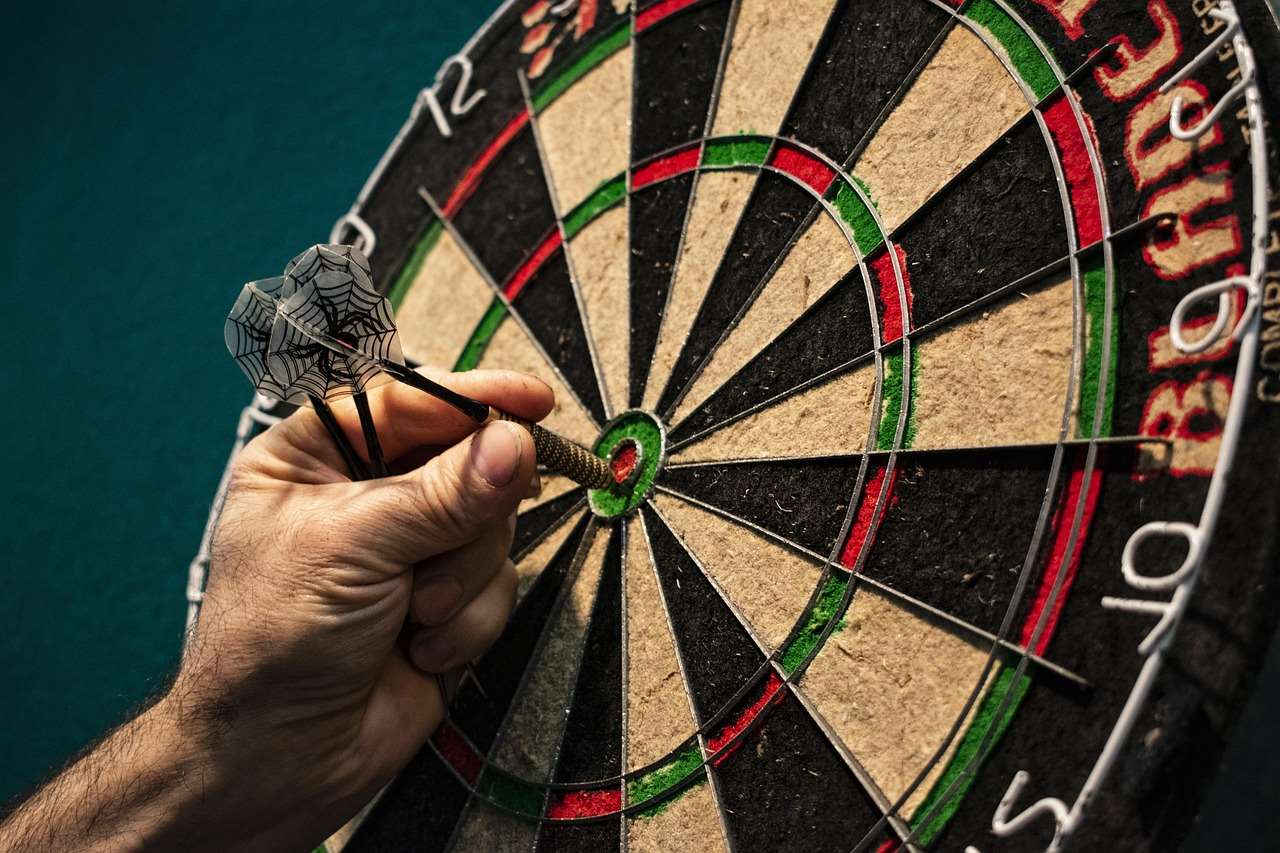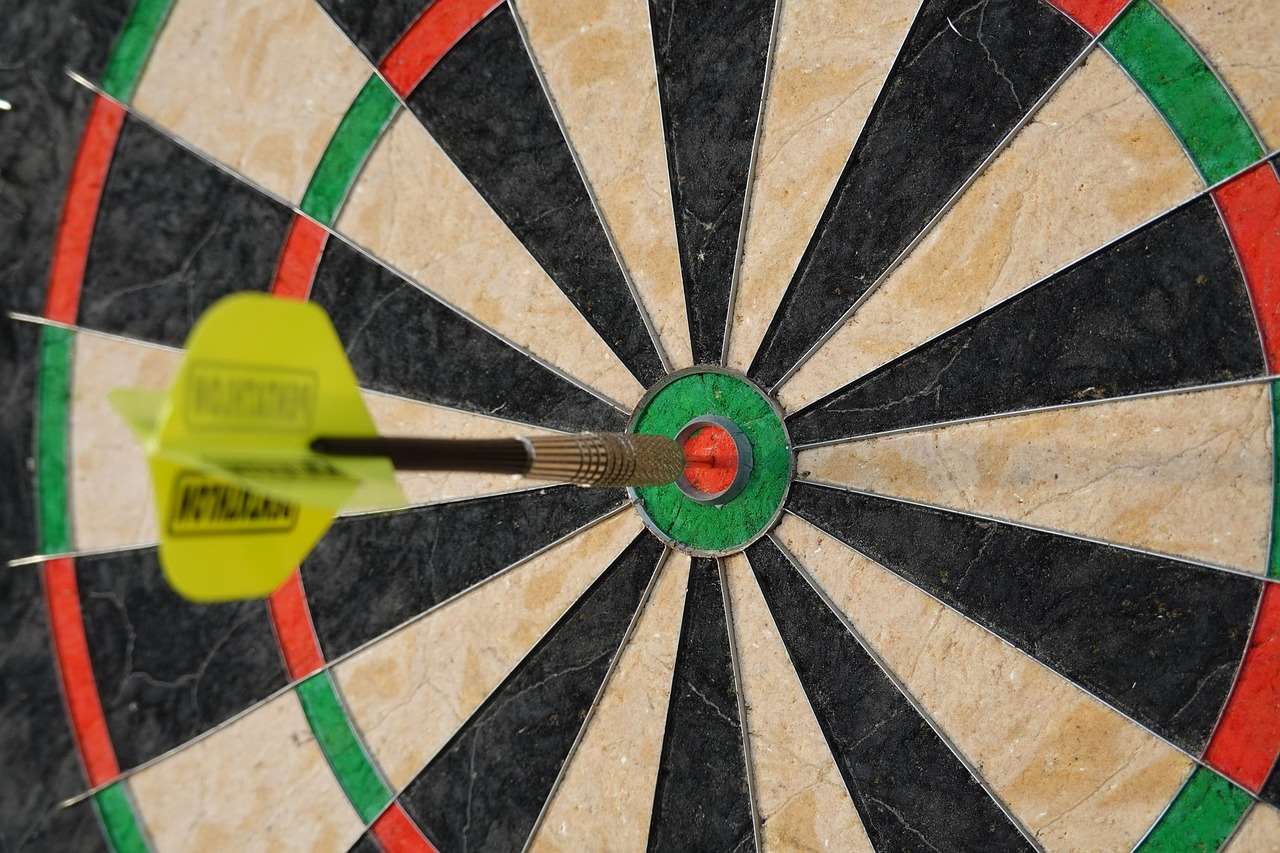Improve your dart skills with **random number practice games darts**, a fantastic way to hone accuracy and mental math under pressure. This article explores various random number drills, their benefits, and how to implement them effectively for a more versatile and confident dart game.
⚠️ Still Using Pen & Paper (or a Chalkboard)?! ⚠️
Step into the future! The Dart Counter App handles all the scoring, suggests checkouts, and tracks your stats automatically. It's easier than you think!
Try the Smart Dart Counter App FREE!Ready for an upgrade? Click above!
Why Use Random Number Practice Games for Darts?
Traditional dart practice often involves repeatedly aiming for the same targets, such as the treble 20 or bullseye. While this can improve your proficiency in hitting those specific areas, it can also lead to a lack of adaptability during a real game. Random number practice games address this limitation by forcing you to quickly switch between different targets, mimicking the unpredictable nature of competitive play.
Here’s a breakdown of the key advantages:
- Improved Accuracy: By constantly adjusting your aim to different numbers, you’ll refine your overall accuracy across the entire dartboard.
- Enhanced Mental Math: Many **random number dart games** require quick calculations, improving your mental arithmetic skills, which are crucial for quickly figuring out outs.
- Increased Adaptability: You’ll become more comfortable switching between targets and adjusting your throwing technique on the fly.
- Reduced Pressure: Practicing under varied conditions helps you become less fixated on hitting specific targets, reducing performance anxiety.
- Enhanced Focus: Switching targets frequently forces you to maintain a higher level of concentration throughout your practice session.

Popular Random Number Darts Practice Games
There are several variations of **random number practice games darts**, each with its unique set of rules and benefits. Here are some of the most popular options:
Around the Clock (with a Twist)
This classic game involves hitting each number on the dartboard in sequence, from 1 to 20. However, to make it a **random number drill**, you can use a random number generator to determine the order in which you must hit the numbers. This adds an element of surprise and forces you to adapt your aim quickly.
For added difficulty, require yourself to hit the number with a single dart. If you miss, you must start that number over. You can also incorporate doubles and triples to challenge yourself further. Explore Darts Variants Fun Games for added game play ideas.
Random Checkout Practice
This game focuses on improving your checkout abilities. Use a random number generator to select a checkout number (e.g., between 40 and 170). Then, you must attempt to checkout from that number. This helps you practice different checkout combinations and improve your mental arithmetic skills. Consider starting with simpler checkouts before moving onto more complex ones.
This is excellent practice as you are not always going to be left with your favourite outs. It forces you to think on your feet and get comfortable with different combinations. This exercise also helps develop an eye for the board, allowing you to quickly identify possible checkout routes.
Random Segment Challenge
Divide the dartboard into segments (e.g., four quadrants or six sections). Assign each segment a number. Use a random number generator to select a segment. You must then aim for any target within that segment. This improves your overall accuracy within specific areas of the board.

High Score Random
Set a number of rounds, say 10 or 20. Before each round, use a random number generator to select a target number. Throw three darts, attempting to score as close to the target number as possible. The player with the highest cumulative score after all rounds wins.
This requires both accuracy and mental calculation, allowing you to strategically choose which targets to aim for to maximize your score in each round.
Odd/Even Challenge
Use a random number generator to select “odd” or “even”. You can only score points if your dart lands on an odd or even number, according to what the generator has selected. If it picks “odd”, only scores from 1, 3, 5, 7, 9, 11, 13, 15, 17, 19, and 25 (bullseye) will count. If it picks “even”, then only numbers 2, 4, 6, 8, 10, 12, 14, 16, 18, 20 will count.
This helps you think and react quickly and improves accuracy. It also gives you an appreciation for the numbers you might normally avoid during a match.
Setting Up Your Random Number Darts Practice Games
Implementing **random number practice games** is simple. Here’s what you need:
- Dartboard and Darts: Obviously, you can’t practice **random number practice games darts** without a suitable dartboard and a set of darts that work well for you.
- Random Number Generator: You can use a physical dice, a deck of cards, or a digital random number generator app on your smartphone or computer. Many free apps are available for both Android and iOS.
- Scoreboard or Notepad: To keep track of your scores and progress, especially when playing against an opponent.
- A Positive Attitude: Remember, the goal is to improve and have fun, so don’t get discouraged by misses.
Remember to choose a game, write out the rules, and set up your random number generator before you start.

Tips for Maximizing Your Random Number Darts Practice
To get the most out of your **random number darts practice**, consider these tips:
- Vary the Games: Don’t stick to the same game every time. Rotate through different **random number drills** to keep your practice fresh and challenge different aspects of your game.
- Set Goals: Define specific, measurable, achievable, relevant, and time-bound (SMART) goals for your practice sessions. For example, “Increase my checkout percentage from random numbers by 5% in the next month.”
- Focus on Technique: Don’t sacrifice your throwing technique for the sake of hitting the target. Maintaining proper form is crucial for long-term improvement.
- Track Your Progress: Keep a record of your scores and performance to identify areas where you need to improve.
- Practice Regularly: Consistency is key. Aim to practice for at least 20-30 minutes several times a week.
Consistent practice is essential. However, remember to also take rest days to allow your muscles to recover.
Incorporating Related Games into Your Practice
To further diversify your practice, consider incorporating elements from other dart games that require accuracy and strategy. You can blend aspects of games like ‘Cricket’, or even research obscure dartboard games list for inspiration, into your random number routines to create unique and challenging practice scenarios.

Mental Preparation and Random Number Practice
A key element of success in darts is mental fortitude. Practicing with **random number practice games darts** can help develop this. When you’re faced with unpredictable targets, you learn to quickly assess the situation, formulate a strategy, and execute your throw under pressure. This mirrors the mental demands of a real dart match.
Here are some tips for mental preparation:
- Visualization: Before each throw, visualize the dart hitting your target.
- Positive Self-Talk: Encourage yourself and focus on your strengths.
- Stay Calm: If you miss, don’t get discouraged. Take a deep breath and refocus on the next throw.
- Learn from Mistakes: Analyze your misses and identify what you can do differently next time.
Advanced Random Number Darts Drills
Once you’ve mastered the basic **random number practice games**, you can move on to more advanced drills to further challenge yourself:
- Handicap System: If practicing with a partner, implement a handicap system based on skill level to keep the games competitive.
- Limited Darts: Restrict the number of darts you can use to hit a specific target, increasing the pressure and demanding greater accuracy.
- Moving Targets: Imagine a moving target or add distractions to simulate real-game conditions.
These advanced drills will push your skills and help you adapt to even more unpredictable situations. Remember to keep things interesting to prevent boredom and encourage sustained improvement. You might even find inspiration in forgotten pub dart games that incorporate unique scoring methods.

The Future of Darts Practice: Integrating Technology
Technology continues to evolve, and its impact on darts practice is growing. Advanced dartboards with built-in scoring and analysis features are becoming increasingly popular. These smart dartboards can track your accuracy, identify your weaknesses, and even suggest specific **random number practice games** tailored to your needs.
Additionally, virtual reality (VR) and augmented reality (AR) technologies are being developed to create immersive and interactive darts training experiences. These technologies could revolutionize the way we practice darts in the future, making it more engaging, efficient, and personalized.
Conclusion
**Random number practice games darts** offer a powerful and effective way to improve your dart skills, enhance your mental math abilities, and increase your adaptability on the dartboard. By incorporating these drills into your regular practice routine, you can develop a more versatile and confident game. Remember to vary the games, set goals, focus on technique, and track your progress. Now, grab your darts, fire up that random number generator, and start practicing! To elevate your practice further, explore different old dart games rules and incorporate their unique elements.
Hi, I’m Dieter, and I created Dartcounter (Dartcounterapp.com). My motivation wasn’t being a darts expert – quite the opposite! When I first started playing, I loved the game but found keeping accurate scores and tracking stats difficult and distracting.
I figured I couldn’t be the only one struggling with this. So, I decided to build a solution: an easy-to-use application that everyone, no matter their experience level, could use to manage scoring effortlessly.
My goal for Dartcounter was simple: let the app handle the numbers – the scoring, the averages, the stats, even checkout suggestions – so players could focus purely on their throw and enjoying the game. It began as a way to solve my own beginner’s problem, and I’m thrilled it has grown into a helpful tool for the wider darts community.